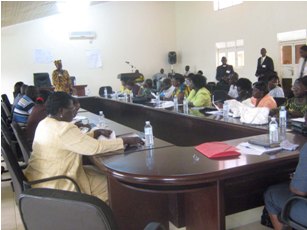Sudan E. Equatoria women parliamentarians’ caucus formed
By Julius N. Uma
July 28, 2010 (TORIT) — Women Parliamentarians should not only lobby and advocate for the 25 percent affirmative action at all levels, but also enhance networking between lawmakers both from within and outside Sudan, an experience-sharing workshop resolved recently.

The seminar; the first in post-Comprehensive Peace Agreement (CPA) era, was based on the theme, “enhancing the engagement of women in electoral politics in Eastern Equatoria State’.
Organized by the Women Parliamentarian Caucus in collaboration with IKV Pax Christi, the workshop’s main objectives centred on providing space for the legislators to share experiences, network with other legislators from SSLA and affirm women’s leadership role in EES.
Felix O. Osiro, the Torit County Commissioner described the workshop as “an important initiative” that would go a long way towards empowering the legislators.
On his part, however, the EES Assembly Speaker, Hon. Emmanuel Ambrose Ocholimoi and his Deputy Hon. Paul Napon both lauded IKV Pax Christi for organizing the three-day workshop, describing it as “timely”.
The duo encouraged legislators to understand parliamentary rules and procedures, including the country’s laws, if they are effectively perform their functions.
While narrating Sudan’s historical perspective, the EES Deputy Governor of EES, H.E Nartisio Loluke Manir, applauded the initiative, saying the interests of most disadvantaged women have partially been addressed through the 2005 Comprehensive Peace Agreement (CPA).
“Women have historically had no space in the political arena due to cultural and religious norms but [the] CPA and the Interim Constitution of Southern Sudan both challenge the status quo and provide for 25 percent affirmative action,” he said.
According to the EES Deputy Governor, the state government remains committed towards empowering women, with special focus on the girl-child education policy meant to boost girls’ enrolment in schools.
Mariam Ayoti Kundu, the EES Programme Manager for Sudan Integrated Peace-building Programme (SIPP) stressed the need for strengthening the legislative arm of government to enhance their effective roles as lawmakers.
Citing the 2005 Comprehensive Peace Agreement (CPA) and recently enacted South Sudan laws such as the Local Government Act 2009, Judiciary Act 2008, and Land Act 2009, Kundu said it was important to engage lawmakers in linking voices and experiences from communities at grassroots to higher levels.
“Without laws, there cannot be proper functional systems of governance and without which there cannot be peace,” she remarked.
Currently, IKV Pax Christi is reportedly implementing the SIPP programme in Eastern and Central Equatoria, Jonglei and Upper Nile states, in addition to other programmes like the cross-border peace and sports programme as well as the Horn of Africa network and the mediation programme.
The Catholic Relief Services (CRS) and Norwegian Church Aid (NCA) co-financed the three-day workshop, which was facilitated by the Kenya-based Education Center for Women in Democracy (ECWD).
Previously, ECWD facilitated similar workshops and trainings in Uganda, Tanzania, Democratic Republic of Congo, Rwanda, Burundi and Ethiopia.
(ST)
